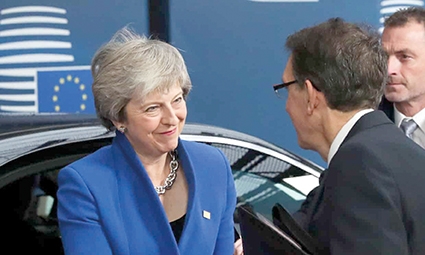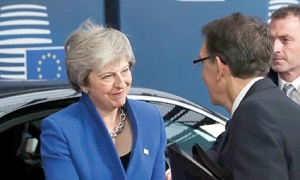Brexit Deal Approved by the EU
An agreement on the UK’s withdrawal from the EU was approved by EU leaders on 25 November. Following 20 months of negotiations, which divided the UK, the deal was approved after less than an hour of discussions by 27 EU leaders. Describing the deal as the “best and only deal possible,” the EU hopes it will pave the way for an orderly withdrawal.
A 585-page withdrawal agreement and 26-page political declaration form the basis of the deal. They outline how important issues such as citizens’ rights, the Irish border, and trade will be handled when the UK leaves the EU on 29 March 2019.
The agreement sets out the calculations for the financial settlement or “divorce bill,” amounting to £39 billion, that the UK will need to pay to the EU to settle all of its obligations such as pensions for EU officials. Part of the money will be the contribution the UK has to pay to the EU during the transition period.
Another central policy priority covered by the deal is the future of trade relations between the UK and the EU. The UK’s access to European markets depends on whether the UK respects EU standards on competition, tax, environment, as well as social and employment protection. Although May stated that the UK and the EU would be “separate markets and distinct legal orders” after Brexit, many believe that the need to adhere to EU rules will still bind the country to the EU.
Moreover, the shared customs territory in the Northern Ireland backstop will be built on and improved in a future trade deal which should maintain cross-border cooperation and allow goods to pass freely across the border. Many believe that such a backstop binds the British government to a customs union.
Despite British wishes for a bespoke deal on financial services, the UK will be treated like any other non-EU country. Bankers and traders will have to rely on “equivalence” which allows market access to be withdrawn by Brussels at 30 days’ notice.
The withdrawal agreement also outlines the future for laws and disputes following Brexit. The UK will remain under the European Court of Justice (ECJ) jurisdiction for the duration of the transition. However, if the backstop is triggered and the UK forms a single customs territory with the EU, the ECJ will not be able to resolve disputes between the UK and EU directly. Analysts believe nonetheless that the European Court will continue to have indirect influence over the UK for many years to come.
The deal must still be approved by the UK parliament in early December, the result of which remains uncertain. Labour, the Lib Dems, the SNP, the DUP, as well as many Conservative MPs are likely to vote against it.
Many politicians are unhappy with the deal, believing that the UK will be worse off as a result. Labour Leader Jeremy Corbyn described the deal as “the worst of all worlds,” reaffirming that his party will oppose the deal.
However, Jean-Claude Juncker, President of the European Commission, stated that anyone in Britain who believes that the bloc might offer improved terms if MPs reject the deal would be “disappointed.” Although politicians are refusing to guess the outcome should British MPs reject the agreement, many believe it will set negotiations back to square one.
Speaking in Brussels, Theresa May called for both Leave and Remain voters to stand behind the agreement. The British public “do not want to spend any more time arguing about Brexit,” she insisted. Whether the agreement is accepted by MPs, remains the be seen.
By Amy Jones
Source: The Guardian, BBC












